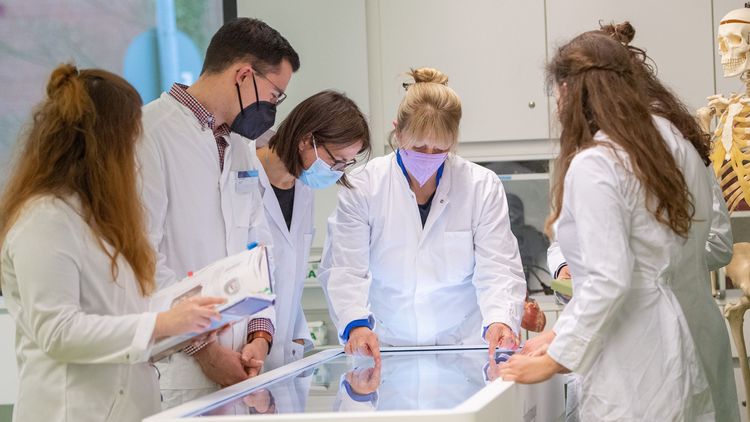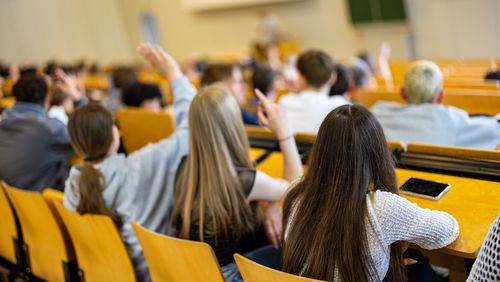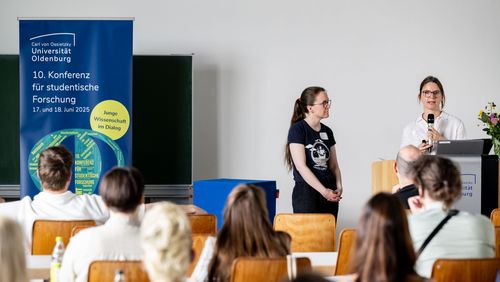From child protection in primary education to virtual reality in anatomy: seven projects at the University of Oldenburg are receiving funding through the Lower Saxony Ministry of Science and Culture's Innovation plus programme.
Over the next two semesters the university will receive around 330,000 euros in funding from the programme to develop various courses. The aim of the project "Innovative Teaching and Learning Concepts: Innovation Plus" is to help teachers to establish new teaching concepts at universities. The Oldenburg projects included in the programme are in the fields of education, economics, economic education, chemistry, biology, physics and medicine. An overview of the projects is provided below.
Child protection in primary education
Teachers have a legal obligation to help safeguard the best interests of children and to cooperate with child and youth services in cases of neglect, abuse or sexual exploitation of children. They need professional skills to be able to detect and assess such situations: How do you pick up on and interpret the signs in daily contact with children? How can primary schools work effectively with child welfare services? What can teachers do to offer children long-term support and provide them with a secure educational biography? Starting this coming winter semester, an in-depth module for students training to be teachers in primary education will provide specialist knowledge in these areas. Participants acquire the basic skills to assess individual cases, evaluate prevention materials and develop protection concepts for primary education. With the module the team led by Prof. Dr. Anke Spies from the Department of Educational Sciences closes a gap between the legal requirements for child protection and teacher training. The module combines digital formats and practical exercises, and is also suitable for advanced teacher training.
Collaborative learning
In the Master's programme Sustainable Renewable Energy Technologies at the Institute of Physics, students from all over the world learn not only about the physical foundations of renewables, but also about political and economic aspects of these energy sources. "It is becoming increasingly important for our graduates to understand and combine different disciplinary perspectives," said the programme's director Dr Herena Torio. In the teaching module "Resilient Energy Systems", students learn to critically assess these various perspectives. Torio's team is developing learning arrangements for "collaborative learning", where the focus is on close cooperation in small teams. Digital tools for structuring content, interactive group boards and appropriate moderation concepts are also incorporated.
Using digitalization to promote sustainable thinking in international relations
Oldenburg student teachers to teach a class in South Africa via distance learning – this is the goal in a project led by biology educationalist Prof. Dr. Corinna Hößle. The topic of the digital teaching module is "Our oceans – threats and ways to protect them". In the first phase of the module, the future biology teachers develop lab experiments focused on problems such as overfishing, pollution, global warming and the protection of marine ecosystems and also learn basic digital media skills. In the second phase, the student teachers independently develop their own digital learning modules in English. At the end of the project they are brought together with South African students from a partner school in the Cape Town suburb of Muizenberg to teach them in a digital classroom. This provides the participants with an opportunity to acquire intercultural and language skills and to network internationally, even in the pandemic.
Anatomy circuit training
Where is the pancreas, and which blood vessels supply it? A new teaching concept designed by anatomist Prof. Dr. Anja Bräuer and her colleague Dr. Esther Maier is based on the idea of circuit training and aims to improve students' spatial understanding of the organs and blood vessels in the abdomen. Bräuer and Maier have developed five stations with learning content on the topic of "The Abdomen" aimed at students of human medicine, sports science, medical informatics, and the Physics, Engineering, Medicine programme. The goal is for the students to experience spatial anatomy in all its complexity. In addition to classic methods such as studying human anatomy using either anatomical models or in vivo test subjects, the Circular Training Anatomy course features a virtual dissection table, a digital learning tool and, coming soon, augmented reality glasses. With this combination students train their spatial thinking to improve their understanding of anatomy and also gain experience in the application of modern digital concepts to medicine.
Learning by gaming for future entrepreneurs
Developing a business model is one of the most challenging tasks for entrepreneurs. The "Start-up Management" seminar led by Prof. Dr. Alexander Nicolai of the Department of Business Administration, Economics and Law introduces students from all subject areas to the diverse possibilities of game-based learning – i.e. the transfer of knowledge through computer or video games. Together with his research assistants, Nicolai is developing a digital interactive game that aims to coach participants in the fundamentals of business model development. "A game not only conveys knowledge, but at the same time reduces inhibitions and increases participants' motivation, making it possible to teach the complex subject of founding a start-up in a practical and exciting way," Nicolai explains.
Interactive from the outset
How do social dilemmas arise – and how can they be resolved? Experiments on economic questions like these offer an excellent starting point to exploit the advantages of digital teaching, say Prof. Dr. Dirk Loerwald and Markus Allbauer-Jürgensen from the Institute of Economic Education (IÖB). The two economists are working on integrating interactive digital experiments into two basic lecture series that introduce future teachers of economics and political economy to central economic concepts – irrespective of whether the course takes place in a digital, hybrid or face-to-face context. Digital experiments on topics such as international trade, sustainable consumption or price formation aim to actively involve the students in the lectures, thus developing their decision-making skills and sharpening their judgement already in the early stages of their studies.




